Budget 2014 - A Budget Worth Dancing Over | 500 Words
By Alastair Thompson
A Budget Worth Dancing Over
The dancing with delight episode attributed to Australian Treasurer Joe Hockey as he prepared for Tuesday's equivalent of our 1991 "mother of all budgets" raised rather a lot of eyebrows on both sides of the ditch.
By contrast Bill English's sixth Budget may actually merit a trip on the light fantastic.
Just why Joe was dancing is anyone's guess, though I expect Ruth Richardson was also feeling pretty pleased with herself in 1991 when she delivered her body blow to NZ's welfare safety net.
But if Bill and Mary English's toes were twinkling last night it would have been well justified. Six years ago after Lehman Brothers hit the wall this Treasurer set his course. Today the first milestone has been delivered with a return to surplus.
And six years hence the second target is now in sight, a Govt. debt to GDP ratio under 20% by 2020.
Even two years ago in I was a little sceptical about the result being achieved in the time and manner Treasury was forecasting. Back then the Christchurch re-build was failing to thrive. Forecast wage (and income-tax take) growth seemed to be a over-egged. But on the other side of the equation Treasury was forecasting a veritable explosion in trade with China.
Two years later Christchurch's rebuild is gathering steam, wage inflation was indeed over-stated but the forecast China trade boom delivered and then some. And NZ's current account deficit problem, the one thing that everybody agreed was our achilles heel, has made a remarkable turnaround.
Looking through this year's Budget Economic and Fiscal update it is hard to find anything to be concerned about. Whichever way you look at it NZ's economic outlook is starting to look remarkedly benign.
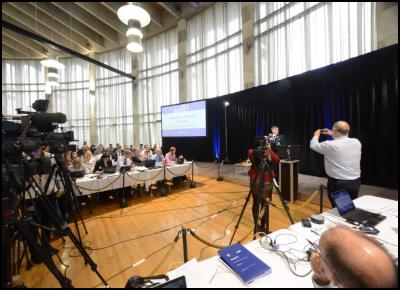
Click for big version
The Importance of Doing What You Say You Will
Any Chief Financial Officer worth his salt lives and dies on the quality of his predictions.
And on that measure Treasury and Finance Minister Bill English have performed remarkably over the past six years. The precise recovery path mapped out back in 2008, 2009 and 2010 has indeed come to pass. On the numbers pretty much exactly as expected.
As a result in the coming 24 to 48 hours the NZ "rock-star" economy story is likely to some more play in global media.
Being the first developed country in the world to head back into surplus following the Great Financial Crisis of 2008 is no small thing. And as a treasury boffin remarked in the lockup today, when you look at a NZ Treasury reported surplus it really is what it appears to be, something that cannot be said for the Government accounts of many members of the OECD .
The probity of NZ's government accounting systems is now world leading. And proof of the recipe can possible be found in Budget 2014.
The thanks due for this belong to the NZ Treasury and a series of Finance Ministers from both ends of the political spectrum, Ruth Richardson, Bill Birch, Michael Cullen, Bill English and even Winston Peters deserve more than a few accolades.
Twenty years of financial discipline at the heart of government are now delivering potent dividends.
A country which can face down a global financial crisis and a series of natural disasters and come out the other side rosy side up , as predicted, and well ahead of the rest of the world is a country which can hold its head high.
At which point it is possibly the right time to recall what underpins this aspect of NZ public administration, namely Ruth Richardson and Bill Birch's 1991"Fiscal Responsibility Act".
It is this law that requires the Government of the day to formulate short term and long term fiscal objectives and to constantly measure itself by them. It requires Treasury to properly model expenditure and revenue on an accrual basis and to produce regular financial accounts and forecasts of a standard which any rock-star CFO would be proud.
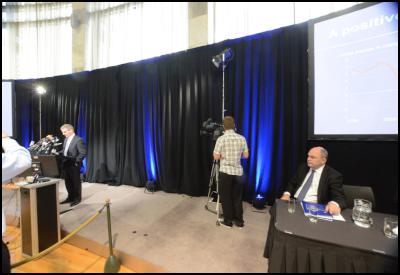
Click for big version
A Budget For International Consumption
And so today the National Government can be justifiably proud of this result. As indeed we can all be. The pain experienced by many over the past six years hasn’t been for nothing.
And as today's Budget is being delivered just two days after Australians were delivered some serious budget shock, it is inevitable that the rest of the world will make favourable comparisons about New Zealand vs our cousins across the ditch in the coming days.
Which is another welcome change.
NZ has been left so much in Australia's wake for the past decade and a half, so much so that 15% of our population has emigrated to the "lucky country". While today's positive news should be tempered by the massively higher wages and productivity experienced across the ditch, it is nevertheless something to savour.
As for the market reaction it will be interesting to see whether the NZD rises vs the AUD on this budget.
While the numbers are good news. They have been flagged for six years and this result is exactly as expected. On that basis NZ's good prospects ought to already be priced in.
Meanwhile across the ditch the "recovery budget" will have delivered the long term directional message to the financial markets that they wanted to hear - and so may be viewed as a net positive for the AUD.
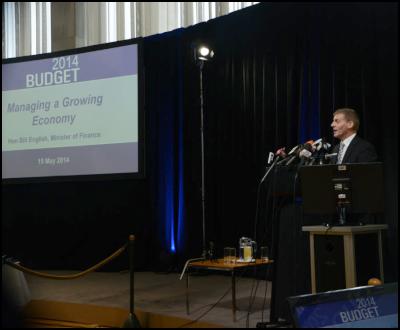
Click for big version
A Budget of Small Nibbles Presented as Such
Dominion Post cartoonist Tom Scott's somewhat prescient cartoon this week showed Bill English at the rudder of a sailing vessel NZ becalmed. Prime Minister John Key is beside him remarking, "steady as she goes".
Achieving the surplus as planned in the 2014-15 fiscal year has meant holding on very tightly to the spending reigns that have been the abiding characteristic of this Government since it was elected in 2008.
In the end it was a close run thing for Bill English deliver the outcome he had planned, on the intended day. Tax revenue growth was running behind recent forecasts and so legitimately getting the country back into the black on cue was always going to be a stretch. And any small forecast deficit - rather than a surplus - would have meant no chocolate fish for the Finance Minister today.
The budget day forecast surplus (OBEGAL) unveiled today of $372 million is well within the margin of error of quarterly forecasts let alone annual ones, but it is a surplus and that is all that matters.
And to achieve it the National cabinet fell back on an oft used technique of NZ Finance Ministers in recent years to manage the expectations of voters to at least see something concrete in their budget - jam tomorrow.
And so the nice small glossy "managing a growing economy" Budget 2014 Executive Summary is not exactly brimming with election bribes. As far as election budgets go at the end of a second term, this budget is probably setting records for parsonimity.
So what did we get?
The only substantial new item in Budget 2014 is a $500 million families package which will doubtless deliver the headlines tomorrow which it is intended to deliver.
But in reality
this package is not only not very big, but its not really
now. Its jam packed with jam tomorrow. The biggest
components are:
- $172 million to extend paid parental
leave by four weeks, slowly, two additional weeks
this year and two next year;
- $42 million in
tax credits for parents, but not starting till 1
April 2015;
- $90 million for free GP visits for
under 13-year-olds, starting 1 July
2015;
These can hardly be seen as significant election bribes.
As usual the vast bulk of additional funding allocated in Budget 2014 has gone to NZ Super, Vote Education, Vote Welfare and Vote Health.
There are a few other interesting nibbles which you can read about in the comprehensive media kit which accompanies today's budget. But most of the initiatives are addressing areas where cuts to spending over the past few years have created serious need - in this respect it looks much more like a Labour Government budget than a National one.
The fact that these areas are top of the spending priority pile is due to the fact that six years of public service spending cuts have left lots of areas of serious funding need in the community sector.
That these are now receiving some attention will be welcomed by community groups, but it is very much just a start.
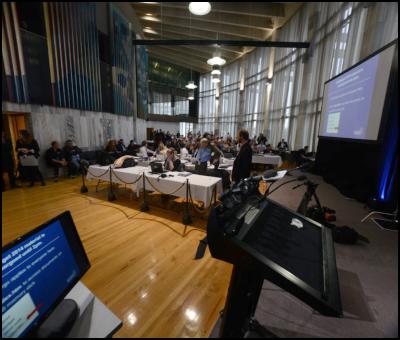
Click for big version
Looking Forward To Tax Cuts ( Or Not )
Those who were looking for tax cuts to be flagged in this budget, i.e. the National Party base, may be a bit disappointed in this budget, a point made obvious in blogger David Farrar's question to the Finance Minister during his lock-up Q&A.
In order to assuage this disappointment the Prime Minister yesterday hinted that tax cuts in the future are an option and the Finance Minister today talked about the possibility of "modest" tax cuts.
However this is not the message that is being delivered in the budget documentation itself.
In fact the centrepiece in the Fiscal Strategy Report is a strongly worded warning that any fiscal loosening (i.e. tax cuts) given with one hand will likely result in interest rates rising faster on the other.
And so not only are no tax-cuts flagged for the next term of this government should it be re-elected, but both Treasury and the Finance Minister have made it pretty clear that they don't want there to be any more tax cuts, any time soon.
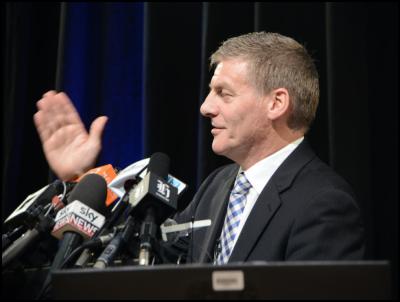
Click for big version
Looking Towards The Election
This morning's Fairfax/Ipsos poll results divining public views on Government financial management related issues would have put a smile on everybody in the National Party's election war room.
The numbers tell a very clear story. The public think that this Government is managing the economy well, and they think that their personal financial interests are served by keeping things pretty much as they are.
Notably a clear majority think that interest rates (which are of considerable moment to the struggling middle of NZ) will be lower under National. And they also think that this government is doing ok on employment.
All of which creates some considerable difficulty for the opposition going into a September election.
As expected the election is going to be held in a steadily improving economy. Now we know the extent of that recovery. Growth of 3% + can be expected to be inflationary, and consequently to signal rising interest rates. ( It is worth noting however that in his Q&A the Finance Mnister said that inflationary pressures appeared to be weaker than expected, a story he said he expected to play out in coming months.)
Because of this, in the minds of many heavily indebted NZ householders this election is likely to become a pocket-book election with interest rates the issue of the hour.
National's strategy is to play to these fears, to hold themselves up as trustworthy stewards of the economy who are sticking to their knitting. The PM's frequent use of the word "whacky" in relation to the opposition's economic ideas shows how they plan to position this debate.
On the other side of the equation the Labour Party have clearly addressed a vote-winner in relation to electricity prices with their NZ Power policy. However they are potentially quite vulnerable around their novel ideas about monetary policy reform via a variable savings rate ( "If it ain't broke why fix it?" )
New Zealand has now had three decades of pretty consistent rather orthodox open market economic thinking. In reality whatever the outcome of the election this is unlikely to change significantly, but in elections it is the perception that matters.
And at that point the election economic debate looks set to turn more on the economic narrative which sits behind the modest surface proposals advanced by each side.
Voters will be presented with a choice between more of the same with National ( "and look how that turned out - rather well" ) versus proposals for economic innovation predicated on ideas that inequality is on the rise and that people are being left behind. The Opposition is currently set to argue that something is fundamentally wrong with the orthodoxy, and that it is time to think outside the box and do even better ( "while we are doing ok, we could so much better and be more inclusive" ).
With the delivery of Budget 2014 the stage is now set for this debate to begin in earnest.
ENDS



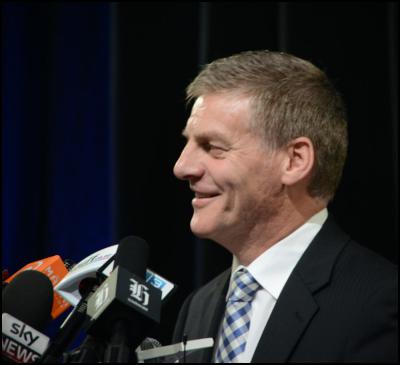
 Ian Powell: Gisborne Hospital Senior Doctors Strike Highlights Important Health System Issues
Ian Powell: Gisborne Hospital Senior Doctors Strike Highlights Important Health System Issues Keith Rankin: Who, Neither Politician Nor Monarch, Executed 100,000 Civilians In A Single Night?
Keith Rankin: Who, Neither Politician Nor Monarch, Executed 100,000 Civilians In A Single Night? Eugene Doyle: Writing In The Time Of Genocide
Eugene Doyle: Writing In The Time Of Genocide Gordon Campbell: On Wealth Taxes And Capital Flight
Gordon Campbell: On Wealth Taxes And Capital Flight Ian Powell: Why New Zealand Should Recognise Palestine
Ian Powell: Why New Zealand Should Recognise Palestine Binoy Kampmark: Squabbling Siblings - India, Pakistan And Operation Sindoor
Binoy Kampmark: Squabbling Siblings - India, Pakistan And Operation Sindoor